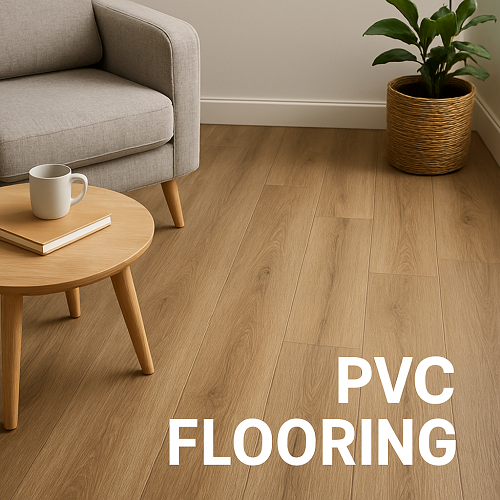PVC flooring, also known as vinyl flooring, has become one of the most popular flooring options in both residential and commercial spaces. Made from polyvinyl chloride (PVC), this type of flooring combines durability, affordability, and design versatility, making it an excellent choice for many environments.
What is PVC Flooring?
PVC flooring is a synthetic flooring material composed primarily of polyvinyl chloride. It is manufactured in sheets or tiles and often features a printed design layer that mimics the look of natural materials such as wood, stone, or ceramic. The surface is typically coated with a protective wear layer, which adds to its durability and resistance to scratches, stains, and moisture.
Advantages of PVC Flooring
- Durability: One of the main reasons for PVC flooring’s popularity is its resilience. It can withstand heavy foot traffic, making it ideal for commercial spaces like offices, retail stores, and healthcare facilities.
- Water Resistance: Unlike wood or carpet, PVC flooring is highly resistant to water and moisture. This makes it a great option for kitchens, bathrooms, basements, and other areas prone to spills or humidity.
- Easy Maintenance: PVC flooring is simple to clean and maintain. Regular sweeping and occasional mopping with mild detergents are enough to keep it looking fresh and new.
- Affordability: Compared to hardwood, stone, or ceramic tiles, PVC flooring is budget-friendly without compromising on style or quality.
- Design Versatility: Thanks to advances in printing technology, PVC flooring can mimic almost any pattern or texture, from rustic wood grains to sleek marble finishes. This allows homeowners and designers to achieve a high-end look without the associated costs.
- Comfort: PVC floors tend to be softer and warmer underfoot compared to harder surfaces like tile or concrete, adding comfort to your living or working space.
Installation Methods
PVC flooring comes in various formats, including sheets, planks, and tiles.
Depending on the product and application, installation methods can vary:
- Glue-Down: Traditional installation where adhesive is applied to the subfloor.
- Click-Lock: Interlocking planks or tiles that snap together for a floating floor installation.
- Loose Lay: Heavy sheets or tiles that stay in place due to their weight and backing, allowing for easier replacement.
Environmental Considerations
While PVC flooring is durable and long-lasting, it is a plastic-based product, which raises concerns about environmental impact. However, many manufacturers now offer eco-friendly options made with recycled materials or designed for recyclability at the end of their life cycle. some PVC floors are certified low-VOC (volatile organic compounds), contributing to better indoor air quality.
Who Should Choose PVC Flooring?
PVC flooring suits a wide range of users:
- Homeowners seeking affordable, stylish, and easy-to-maintain flooring.
- Businesses needing durable floors that handle high traffic.
- Facilities like hospitals and schools that require hygienic, moisture-resistant surfaces.
PVC flooring offers a practical, attractive, and cost-effective flooring solution for various settings. Its combination of durability, water resistance, and design flexibility continues to make it a top choice for those looking to enhance their spaces without breaking the bank. Whether renovating a home or outfitting a commercial property, PVC flooring is worth considering for its long-lasting performance and aesthetic appeal.


































